How the Coronavirus Helped Alex Casnoff Rediscover Making Music
The former frontman for Harriet becomes a self-produced bedroom artist uploading his music directly to his fans




Alex Casnoff first emerged as the fill-in keyboard player in Dawes, accompanying the band on multiple tours and in the studio for their sophomore album, 2011’s Nothing Is Wrong. The album, which featured vocals from Jackson Browne and was produced by Jonathan Wilson, who has since emerged as a collaborator of Lana Del Rey and Roger Waters, was a high-profile entrance into rock ’n’ roll—the experience of which may have left Casnoff more optimistic than might be recommended as his band, Harriet, quickly built buzz.
Harriet released their first EP in January of 2012, a 20-minute dash of electronically hinged rock and earworm melodies that were either wonderfully sentimental or cunningly witty. Casnoff is a storyteller by nature, and that first EP played with narrative formalism by switching perspectives, narrators, and time periods.
“Film is probably my main influence and always has been in terms of lyrics. Growing up, my family would have classic film nights every week. I feel like screenwriters and even just the images of certain films are probably just as big of influences on my songwriting as any songwriter,” he said. This philosophy has stayed with Casnoff as he’s moved onto other projects, showcasing a style indebted to bold storytelling and precise, detailed imagery.
Today, all Casnoff needs to record a song is an acoustic guitar and his laptop microphone. This is a recent discovery for the 31-year-old songwriter from Los Angeles who until the pandemic struck was finding little in the way of inspiration. Until the dissolution of his fantastic band, Harriet, Casnoff was a studio staple―using big rooms and glossy effects to transcend the traditions of quartet rock groups. His new music, quietly released on SoundCloud and promoted on Instagram under his own name, is diametrically opposed to the process he once knew. And now that he’s shown that the work can still be done, he has no intention of slowing down.
Singing sweet melodies into an Apple speaker wasn’t always Casnoff’s plan. “During the few months before this all started happening, I had been thinking about getting back into the studio, and I had been talking to my old friends like [producer] Sean O’Brien about setting up some studio time,” Casnoff told Tablet from his girlfriend’s mother’s house on Long Island. “I really wanted to make an EP or something at some point this summer.”
Those plans, like all of our plans, have been thoroughly squashed, but Casnoff has reengaged with his recording roots as a way to feel productive when it’s become very easy not to. “I hadn’t completely stopped making music. I had still been writing sometimes―I don’t know that it’s something that I ever could stop,” he said. “It’s something that I did more to clear my head than anything else. I started recording when I got out here, just with what I had,” he added.
Casnoff’s journey from the end of 2017 to now, as a MacBook maestro for a new generation, was tumultuous, the result of professional relationships crumbling, leaving him feeling confused and alone. Harriet released their one (excellent) LP, American Appetite, in 2016, before Casnoff and his group called it quits in late 2017 or 2018. The breakup was so numbing to Casnoff that he still has trouble recalling when or how the entire thing unfolded.
“Nobody ran out of the room and said ‘I quit,’” he remembered. “It just fizzled. We went on tour opening up for Edward Sharpe and it went well, but it was clear that the band wasn’t going to survive. I think people wanted to be doing their own things,” Casnoff said, before adding, “Our record took three or four years from when we first got in the studio to when the label put it out. If anything connects to why we broke up, it would be that.”
Casnoff took the breakup hard. “I was a broken-hearted teenager from that experience. It took me years to get over,” he said. “I wasn’t really sure what I was going to do. I wasn’t sure if I could just start making music by myself. So I started doing what everybody I knew in LA was doing, which meant writing pop songs. I started working with some friends writing songs for artists, and it was the most depressing thing I’ve ever done.”
After a move to New York, Casnoff found his way into acting, even scoring a role as a right-wing militia member on Manhunt. What began as a bit part turned into a four-episode recurring role, but Casnoff’s brief waft of acting success couldn’t deter his love of songwriting and performing.
A few days after a Zoom Passover Seder with his parents, Casnoff and I spoke to discuss his desire to release new music, even in an unpolished and highly personal way. “I think this is really good for me now, and a nice step. I press space bar to record and stop, mess with it a bunch, and then just fucking throw it on the internet that day,” he said.
Casnoff, like so many artists, is an unrelenting perfectionist, willing to spend weeks on a snare-drum sound or a month on a vocal delivery for a single word. “I don’t have any choices of microphones, I don’t have any choices of instruments, I don’t have any choices of people besides myself. There’s something nice about that, because I sometimes overthink things. Things take me a really long time when I get into the studio but that need for perfection can sand down the edges too much, and I like just doing it in a day, and seeing the result reach an audience almost immediately.”
Casnoff has just a few new songs uploaded to his SoundCloud. The only person he follows on the app is Sorcha Richardson, whose new LP he produced in 2019. Each of his new songs is a microcosm of everything he’s done brilliantly throughout his career. “Take Me Home” uses that now-signature acoustic guitar to prop up his downcast vocals, practically begging for any other time but the one Casnoff is trapped in. It’s nostalgic for something that never was, which is always the worst kind of yearning. The drums are muffled until the chorus, where they provide a powerful low end to Casnoff’s simple and succinct chorus: “Take me home/take me home.”
“My Old Friends” recalls Leonard Cohen raised on Radiohead. The track uses a quietly intense first verse to introduce a cacophony of electronics and a cathartic final chorus. The song is an ode to the friends that shaped Casnoff, a more obvious desire to return to a time in which hanging out or even talking on the phone wasn’t a reminder of everything we’re no longer able to do.
At one point, Casnoff reflected on how, exactly, he reemerged as a self-produced bedroom artist uploading his music directly to his fans. “I’ve always been in bands. I’ve never been just a solo musician; I feed off of collaboration,” he said, almost realizing as he spoke that it would be quite some time before such a possibility would arise again. “I grew up playing jazz and shit. I like playing with other people. The idea of getting into a studio with a bass player and a drummer sounds amazing. But, on the other hand, I also like the immediacy of not having really any options. It’s just me.”
Will Schube is a writer and filmmaker based in Austin, Texas.